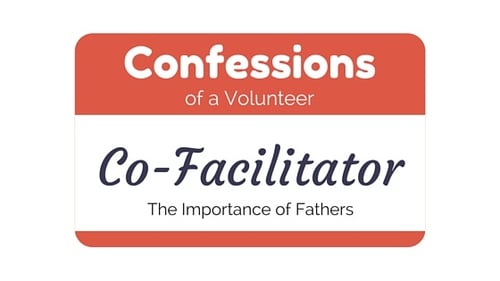Confessions of a Volunteer Co-Facilitator > The Importance of Fathers
3 min read
Date Published: 06/02/2016
Last Updated: 10/15/2021
National Fatherhood Initiative Blog / Latest Articles
3 min read
What's it like to serve fathers? Glad you asked. I recently applied with my county government to be a "volunteer co-facilitator". After four years of working at National Fatherhood Initiative (NFI), I decided to volunteer in my county. After applying (and passing my background check—yay!), I'll spend the next 12+ weeks with 15+ dads sitting in on a program called 24/7 Dad®.
I will share my thoughts along the way. For fatherhood program facilitators, I'll offer tips on running a successful program. For volunteers, I hope to inspire you to get involved with a program or start one in your city. Let's do this...

I admit, that first night, I was nervous to meet dads who signed up for the class. I didn't know what to expect. But, I was quickly reminded of principles used to create the 24/7 Dad® program and just how important fathers and fatherhood program facilitators are.
We know the irreplaceable role fathers play in their children's lives. Larger than one family problem, father absence is generational. We say at NFI, "It's difficult to be what you don't see." Children who learn inappropriate fathering often reproduce their experience with their own children.
This is where learning fatherhood skills is for every dad—not just absent dads. Dads are modeling life for our children in our absence and in our presence. In everything we do, we impact our children.
Our 24/7 Dad® program (the 12-week curriculum you can find here) is based on several principles. Let me highlight three of these great principles now.
1. The ability to parent children successfully or unsuccessfully is largely a learned set of behaviors.
At the first program session, the facilitator asked one question to the dads in class, "Who has served as mentor and/or father figure in your life?"
I knew this question was coming. But I had no idea the responses would be so open and honest. I confess—I write about how important fathers are all the time. But after hearing dads tell their story in person, I have a deeper perspective. One dad said, "My dad was never around..." Another dad said, "The streets raised me..."
Where did you learn to be a good father? At home? School? Church? Whether your father was absent or not, you learned what to do and what not to do on some level. We were all modeled something—good or bad.
2. Any father, given the chance, can learn to be a great dad.
You can learn to be a great dad. You don't have to be a perfect dad. Recent research by BabyCenter in Millennial Dads Turn to Digital in Their Moments of Need said, "Millennial dads are more involved in the day-to-day of childcare than any generation before them...88% of millennial dads feel it's at least somewhat important to be the 'perfect dad,'..."
More dads want to be involved. Fantastic. But, please don't set yourself up for failure. You can't be the perfect dad, but you can be better. Being better takes learning the skills and practicing those skills.
The dads I see in class are inspiring. Why? Because regardless of the challenge that's led them to this class, they are present. Whether you come to the sessions with a criminal record, you're divorced, about to divorce, don't have a job, about to give up, whatever...being present is the first step. No, there's nothing magically fixed at home just because you show up for a fatherhood class. But, to show up is to start on a different path.
You can learn to be a great dad. Notice I didn't say perfect. I said great.
3. The ability of a facilitator to facilitate effectively is central to success of any fatherhood program.
A fatherhood program is only as good as its facilitator. Successful facilitation takes dedication, skill, and patience. The facilitator must use great curriculum, be trained, and have experience running the program. This takes time, but you know it when you see it.
For example, in our first session, the facilitators needed to balance welcoming the dads and keeping their interest, all while getting applications and pre-program assessments completed. That's a lot of boring paperwork! Our leader explained the importance of each form and let all the dads know what to expect in session one—and that every session would not be a bunch of paperwork!
After the first session, I was reminded that the ability to father is a learned set of skills, that any father can learn to be a great dad, and that a good facilitator is vital to the success of a program. I'll write more about my what I'm learning in the coming weeks. Until then, think about your city. There are fathers who are struggling. You can help them.
Who has served as a mentor or father figure in your life?
Are you a dad looking for help or are you interested in volunteering to help a fatherhood program in your area? Please visit our Fatherhood Program Locator™ to find programs and resources near you.
Date Published: 06/02/2016
Last Updated: 10/15/2021
Download this free guide for a proven 7-step roadmap—from making the case and securing funding for your program, to launching and measuring real results!


Train Your Staff
Fatherhood Programs
Fatherhood Data
© 2026 National Fatherhood Initiative®. All rights reserved.